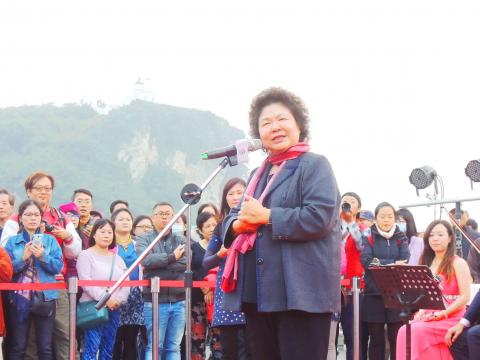Presidential Office Secretary-General Chen Chu (陳菊) yesterday announced that she would sue three political commentators for defamation during the run-up to the nine-in-one elections on Nov. 24 last year and afterward.
In a Facebook post, the former Kaohsiung mayor said there had been a wave of slander and personal attacks against her during the campaign by certain media outlets, commentators and politicians, but the smears and rumormongering worsened after the polls so she felt she had no choice but to seek legal remedy.
She named Wu Tzu-chia (吳子嘉), Hsieh Han-ping (謝寒冰) and Chang Yu-hua (張友驊) as the respondents in her planned lawsuits, which she said she would pay for herself.

Photo: Wang Jung-hsiang, Taipei Times
Citing information gathered by her attorney, Chen said from Jan. 15 to Jan. 31, the alleged smears against her totaled nearly 300 minutes on talk shows aired by Eastern Broadcasting (EBC) and CtiTV.
Forty minutes of one episode, or nearly half of its airtime, were spent attacking her, Chen said, calling the alleged defamation “systemic” and “organized.”
The programs were CtiTV’s News Tornado (新聞龍捲風) and EBC’s Crucial Moment (關鍵時刻), her office said in a statement.
The alleged smears included a claim that the wife of the chairman of a state-owned business had learned how to cook Japanese cuisine for Chen, the statement said.
In the face of a rapidly deteriorating media environment, inaction could lead to society becoming unable to engage in rational dialogue, she said.
While in less severe cases it could constitute online bullying, in the worst cases, it could jeopardize public safety or even develop into extremism or pervasive verbal abuse, she said.
The extensive spread online of comments that have not been fact-checked or that were simply fabricated not only damages a person’s reputation, but also puts the public in the dangerous position of having no means of knowing or determining the truth, she added.
Chen said that she believes people are “mistaken” in believing that freedom of speech allows for comments that are biased, “absurd” or fabricated, as well as those that have not been fact-checked or damage individual or public interests.
She could not sit by while freedom of speech is being abused and misused, she said.
Even if she wins the lawsuits, it would be difficult to restore her reputation, because the allegations would continue to exist online, she said.
However, filing the lawsuits was a “necessary” action in light of a “democratic politics” that is “facing disintegration” and a Taiwanese society that is “in crisis, yet unaware,” she said.

An essay competition jointly organized by a local writing society and a publisher affiliated with the Chinese Communist Party (CCP) might have contravened the Act Governing Relations Between the People of the Taiwan Area and the Mainland Area (臺灣地區與大陸地區人民關係條例), the Mainland Affairs Council (MAC) said on Thursday. “In this case, the partner organization is clearly an agency under the CCP’s Fujian Provincial Committee,” MAC Deputy Minister and spokesperson Liang Wen-chieh (梁文傑) said at a news briefing in Taipei. “It also involves bringing Taiwanese students to China with all-expenses-paid arrangements to attend award ceremonies and camps,” Liang said. Those two “characteristics” are typically sufficient

A magnitude 5.9 earthquake that struck about 33km off the coast of Hualien City was the "main shock" in a series of quakes in the area, with aftershocks expected over the next three days, the Central Weather Administration (CWA) said yesterday. Prior to the magnitude 5.9 quake shaking most of Taiwan at 6:53pm yesterday, six other earthquakes stronger than a magnitude of 4, starting with a magnitude 5.5 quake at 6:09pm, occurred in the area. CWA Seismological Center Director Wu Chien-fu (吳健富) confirmed that the quakes were all part of the same series and that the magnitude 5.5 temblor was

The brilliant blue waters, thick foliage and bucolic atmosphere on this seemingly idyllic archipelago deep in the Pacific Ocean belie the key role it now plays in a titanic geopolitical struggle. Palau is again on the front line as China, and the US and its allies prepare their forces in an intensifying contest for control over the Asia-Pacific region. The democratic nation of just 17,000 people hosts US-controlled airstrips and soon-to-be-completed radar installations that the US military describes as “critical” to monitoring vast swathes of water and airspace. It is also a key piece of the second island chain, a string of

The Central Weather Administration has issued a heat alert for southeastern Taiwan, warning of temperatures as high as 36°C today, while alerting some coastal areas of strong winds later in the day. Kaohsiung’s Neimen District (內門) and Pingtung County’s Neipu Township (內埔) are under an orange heat alert, which warns of temperatures as high as 36°C for three consecutive days, the CWA said, citing southwest winds. The heat would also extend to Tainan’s Nansi (楠西) and Yujing (玉井) districts, as well as Pingtung’s Gaoshu (高樹), Yanpu (鹽埔) and Majia (瑪家) townships, it said, forecasting highs of up to 36°C in those areas